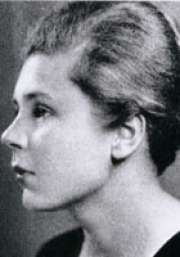|
Biografie Elizabeth Bishop
Elizabeth Bishop (February 8, 1911 – October 6, 1979), was an American poet and writer from Worcester, Massachusetts. She was the Poet Laureate of the United States from 1949 to 1950, and a Pulitzer Prize winner in 1956.
Elizabeth Bishop was born in Worcester, Massachusetts. After her father died when she was eight months old, Bishop’s mother descended into mental illness and was institutionalized in 1916. Although Bishop’s mother would live until 1934 in an asylum, they would not meet again. Effectively orphaned, Bishop lived with her grandparents in Nova Scotia, a period she would later idealize in her writing.
Bishop boarded at the Walnut Hill School in Natick, Massachusetts, where her first poems were published by her friend Frani Blough in a student magazine. She entered Vassar College in the fall of 1929, shortly before the stock market crash. In 1933 she co-founded Con Spirito, a rebel literary magazine at Vassar, with writer Mary McCarthy (one year her senior), Margaret Miller, and the sisters Eunice and Eleanor Clark.
Bishop was greatly influenced by the poet Marianne Moore[4] to whom she was introduced by the librarian at Vassar in 1934. Moore took a keen interest in Bishop’s work, and at one point Moore dissuaded Bishop from attending Cornell Medical School, in which the poet had briefly enrolled herself after moving to New York City following her Vassar graduation. It was four years before Bishop addressed ‘Dear Miss Moore’ as ‘Dear Marianne,’ and only then at the elder poet’s invitation. The friendship between the two women, memorialized by an extensive correspondence (see One Art), endured until Moore's death in 1972. Bishop's "At the Fishhouses" (1955) contains allusions on several levels to Moore's 1924 poem "A Grave." [5]
Bishop traveled widely and lived in many cities and countries, many of which are described in her poems. She lived in France for several years in the mid-1930s, thanks in part to the patronage of Vassar friend, Louise Crane, who was a paper-manufacturing heiress. In 1938 Bishop purchased a house with Crane at 624 White Street in Key West, Florida. While living there Bishop made the acquaintance of Pauline Pfeiffer Hemingway, who had divorced Ernest in 1940.
She was introduced to Robert Lowell by Randall Jarrell in 1947 and they would become great friends, mostly through their written correspondence, until Lowell's death in 1977. After his death, she wrote, "our friendship, [which was] often kept alive through years of separation only by letters, remained constant and affectionate, and I shall always be deeply grateful for it". They also both influenced each other's poetry. Lowell cited Bishop's influence on his poem "Skunk Hour" which he said, "[was] modeled on Miss Bishop's "The Armadillo." Also, his poem "The Scream" is "derived from...Bishop's story In the Village". "North Haven," one of the last poems she published during her lifetime, was written in memory of Lowell in 1978.
She wrote the poem "Visits to St. Elizabeth's" in 1950 as a recollection of visits to Ezra Pound when he was confined there. She also met James Merrill in 1947, and became a close friend of the poet in later years.
Elizabeth Bishop has become an iconic lesbian poet.[citation needed] She had affairs with women and two long term relationships. The first was with Brazilian socialite and architect Lota de Macedo Soares-Soares was descended from a prominent and notable political family; the two lived as a couple for fifteen years. However, in its later years the relationship deteriorated, becoming volatile and tempestuous, marked by bouts of depression, tantrums and alcoholism. Bishop had an affair with another woman and ultimately left Lota and returned to the United States. Soares, suffering from depression, followed Bishop to America, and committed suicide in 1967.
The second was with Alice Methfessel whom Bishop met in 1971, beginning a relationship with her. Methfessel became Bishop's partner and, after her death, her literary executor.
|




